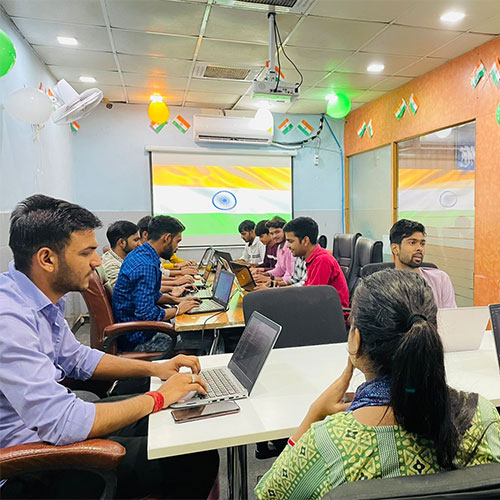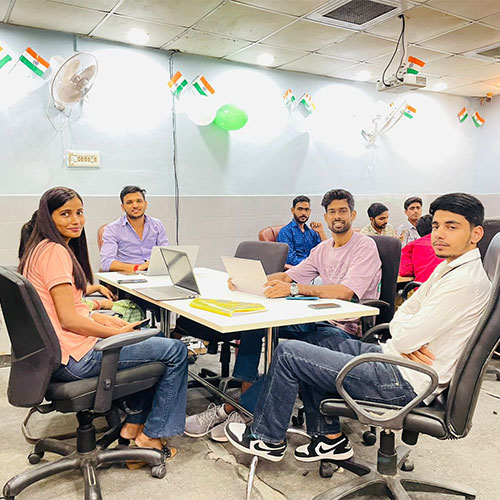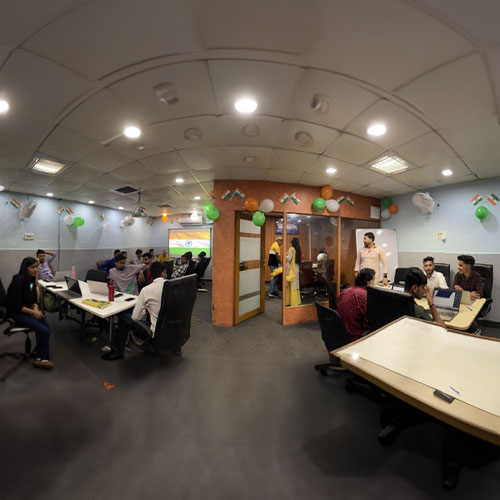What is Node.js?
Node.js is a runtime environment that empowers web developers with a platform to execute JavaScript code beyond the browser. It facilitates server-side scripting, enabling the creation of dynamic and responsive web applications. By utilizing a non-blocking, event-driven architecture, Node.js optimizes scalability and responsiveness, making it a pivotal tool in modern web development.
Why student should choose node.js as a career option?
- High Demand in the Job Market: Node.js has gained immense popularity and is widely used by companies across various industries. This popularity translates into a high demand for Node.js developers, creating a plethora of job opportunities for students entering the field.
- Versatility in Projects: Node.js is not limited to a specific domain or industry. It’s used for building web applications, server-side applications, real-time applications, APIs, and even Internet of Things (IoT) projects. This versatility allows developers to work on a wide range of exciting and innovative projects.
- Rapid Development: Node.js is known for its fast execution and event-driven architecture, which facilitates rapid development. This is especially appealing to students who want to see their work come to life quickly and iterate on their projects efficiently.
- JavaScript Proficiency: For students who are already familiar with JavaScript, transitioning to Node.js becomes smoother. This means that students can leverage their existing skills and deepen their understanding of JavaScript by exploring server-side development.
- Growing Ecosystem: Node.js has a thriving ecosystem of open-source libraries and frameworks. Students can tap into this rich collection to expedite development, implement advanced features, and solve complex problems without reinventing the wheel.
- Scalability and Performance: Node.js is designed to handle asynchronous operations efficiently, making it well-suited for building scalable applications that can handle a large number of concurrent users. Students interested in optimizing performance and scalability will find Node.js intriguing.
- Community and Learning Resources: The Node.js community is welcoming and vibrant. Students can engage with experienced developers through forums, meetups, and online platforms, providing them with valuable learning opportunities and networking prospects.
- Remote Work Opportunities: Node.js development often lends itself to remote work arrangements. This flexibility can be particularly appealing to students who prefer working from different locations or want to explore job opportunities beyond their local area.
- Innovation and Trendsetting: Node.js is often at the forefront of technology trends, contributing to the rise of microservices architecture, serverless computing, and real-time applications. Students who want to be part of shaping the technological landscape will find Node.js an exciting platform to work with.
- Resume Building: Having Node.js expertise on your resume can be a strong differentiator when applying for jobs. It showcases your ability to work with modern technologies and adapt to the evolving needs of the industry.
Key Highlights of the Course:
- Structured Learning: Our online node js course curriculum progresses logically from foundational concepts to advanced topics, ensuring a seamless learning experience for beginners and experienced developers alike.
- Real-world Projects: Gain practical experience by working on real-world projects that mirror the challenges you’ll face in the industry.
- Mentorship and Support: Our instructors are here to guide you every step of the way. From clearing doubts to offering insights, our mentorship ensures you’re never alone on your learning journey.
- Stay Relevant: The tech landscape is always evolving, and our course prepares you for the future. Learn about emerging trends, best practices, and the latest updates in the Node.js ecosystem.
- Community: Join a vibrant community of fellow learners, where you can collaborate, share experiences, and grow together.
Who Should Enroll?
- Aspiring Developers: If you’re new to programming or web development, this course provides a solid foundation to kickstart your journey.
- Experienced Programmers: If you’re already familiar with web development but want to master Node.js, this online node js course will take your skills to the next level.
- Tech Enthusiasts: If you’re passionate about staying ahead in the tech world and exploring cutting-edge technologies, Online Node js course is a must-learn.
What Makes Our Course Stand Out?
Our online node js course isn’t just about learning concepts; it’s about mastering them through hands-on experience. We believe in learning by doing, and that’s why our curriculum is packed with interactive coding exercises, real-world projects, and expert guidance. Led by seasoned Node.js developers, our instructors bring their industry insights, practical experience, and passion for teaching to help you succeed.
Course Curriculum
Module 1: Introduction to Node.js
- Understanding Node.js as a runtime environment for server-side JavaScript.
- Exploring its non-blocking, event-driven architecture.
- Recognizing the significance of Node.js in modern web development.
- Overview of use cases where Node.js shines.
- Highlighting the efficiency of V8 engine in executing JavaScript.
Module 2: Setting Up Your Development Environment
- Installing Node.js and NPM using different installation methods.
- Configuring your preferred code editor or integrated development environment (IDE).
- Verifying the installation and running your first Node.js application.
- Setting up a version control system (e.g., Git) for effective collaboration.
- Managing Node.js versions using version managers (e.g., nvm).
Module 3: Core Concepts of Node.js
- Learning about the V8 JavaScript engine that powers Node.js.
- Grasping the concept of the event loop and its role in asynchronous programming.
- Understanding the concept of non-blocking I/O and its impact on performance.
- Comparing Node.js to traditional server-side technologies.
- Exploring the Node.js global objects and their significance.
Module 4: Working with Modules and Packages
- Understanding the structure of a Node.js module.
- Creating custom modules and using built-in modules.
- Navigating the NPM registry for finding and installing packages.
- Managing dependencies using the package.json file.
- Publishing your own packages to the NPM registry.
Module 5: Asynchronous Programming in Depth
- Examining the callback pattern and its challenges.
- Mastering the concept of Promises and chaining asynchronous operations.
- Utilizing the power of async/await for writing synchronous-like code.
- Handling errors in asynchronous operations using try/catch.
- Debugging asynchronous code using tools like Node.js debugger.
Module 6: Building Web Servers with HTTP Module
- Creating a basic HTTP server using the built-in http module.
- Handling different types of HTTP requests (GET, POST, etc.).
- Parsing request data and sending appropriate responses.
- Implementing server-side routing and URL parameters.
- Enhancing server security through request validation.
Module 7: Introduction to Express.js
- Understanding the role of Express.js in simplifying web application development.
- Installing and setting up an Express.js application.
- Creating and organizing routes for different endpoints.
- Implementing middleware for request preprocessing and logging.
- Building a basic API using Express.js.
Module 8: Advanced Express.js Concepts
- Building modular and reusable middleware functions.
- Handling complex route configurations and route parameters.
- Implementing error handling middleware for consistent error responses.
- Working with query parameters, request bodies, and headers.
- Leveraging third-party middleware for common functionalities.
Module 9: Data Storage and Databases
- Connecting to MongoDB using the official MongoDB Node.js driver.
- Performing CRUD operations (Create, Read, Update, Delete) on MongoDB.
- Modelling data using Mongoose ODM (Object-Document Mapper).
- Handling database transactions and ensuring data integrity.
- Exploring indexing and optimization techniques for efficient querying.
Module 10: User Authentication and Security
- Implementing user registration and login using authentication libraries.
- Hashing passwords securely and using salted hashes.
- Managing user sessions and tokens for secure authentication.
- Preventing common security vulnerabilities (Cross-Site Scripting, Cross-Site Request Forgery).
- Implementing role-based access control for different user roles.
Module 11: Error Handling and Validation
- Implementing input validation using validation libraries.
- Handling different types of errors and exceptions in Node.js.
- Building custom error classes and error handling middle-ware.
- Centralizing error handling for cleaner code and better maintainability.
- Validating API requests using middleware and validating request bodies.
Module 12: Real-time Communication with WebSockets
- Understanding the WebSocket protocol and its advantages.
- Setting up a WebSocket server using libraries like Socket.io.
- Building real-time chat applications with WebSocket communication.
- Emitting events and handling client-server communication.
- Scaling WebSocket applications and managing real-time connections.
Module 13: RESTful API Design and Best Practices
- Designing well-structured RESTful APIs with clear endpoints and actions.
- Implementing versioning to maintain backward compatibility.
- Handling query parameters, pagination, and sorting.
- Using HATEOAS (Hypertext as the Engine of Application State) to enhance API discoverability.
- Documenting APIs using tools like Swagger/OpenAPI.
Module 14: Performance Optimization and Caching
- Analyzing and optimizing code for improved performance.
- Implementing caching strategies using in-memory caching or caching servers (Redis).
- Leveraging browser and server caching for static assets.
- Using load testing tools to identify performance bottlenecks.
- Exploring techniques like lazy loading and code splitting for frontend performance.
Module 15: Testing Node.js Applications
- Writing unit tests using testing frameworks like Mocha or Jest.
- Setting up test suites and organizing test files.
- Writing integration tests for testing components working together.
- Mocking dependencies and using stubs for isolated testing.
- Automating tests using Continuous Integration (CI) tools.
Module 16: Deployment and Continuous Integration
- Deploying Node.js applications to cloud platforms like AWS, Heroku, or Azure.
- Setting up environment variables and configurations for different deployment environments.
- Automating deployment using CI/CD pipelines (e.g., GitHub Actions, Travis CI).
- Managing database migrations and maintaining data integrity during deployments.
- Monitoring application health using logging and monitoring tools.
Module 17: Advanced Node.js Topics
- Working with Streams for efficient data processing and transformation.
- Utilizing the Child Process module for executing external commands.
- Understanding the Cluster module for scaling applications across CPU cores.
- Building microservices architecture using Node.js and communicating between services.
- Exploring serverless architecture with AWS Lambda and Node.js.
Module 18: Microservices Architecture with Node.js
- Understanding the principles of microservices and their advantages.
- Breaking down monolithic applications into microservices.
- Communicating between microservices using APIs or messaging systems.
- Managing data consistency and transactions in a microservices architecture.
- Deploying and scaling individual microservices independently.
Module 19: Emerging Trends and Future of Node.js
- Exploring the role of Node.js in serverless computing.
- Keeping up with the latest updates and features in the Node.js ecosystem.
- Understanding the impact of new JavaScript language features on Node.js development.
- Exploring the adoption of Node.js in emerging technologies like IoT (Internet of Things).
- Preparing for the future by staying adaptable and open to new trends.
Module 20: Final Projects and Showcase
- Collaboratively working on real-world projects to apply all learned concepts.
- Demonstrating completed projects to the class and receiving feedback.
- Reflecting on the journey and sharing experiences with peers.
- Showcasing the portfolio of projects to potential employers or clients.
- Celebrating the successful completion of the Node.js training course.
Career Opportunities after Online Node.js Course
Absolutely, pursuing an Online Node.js course can open up a wide range of promising career opportunities in the tech industry. Here are some of the potential career paths you can consider after completing a Online Node.js course:
- Node.js Developer: As a Node.js developer, you can work on both backend and full-stack development, creating server-side applications, APIs, and real-time features using Node.js and related technologies.
- Full-Stack Developer: With proficiency in Node.js, you can become a full-stack developer, proficient in both frontend and backend development, using technologies like React or Angular for the frontend and Node.js for the backend.
- Backend Developer: Specialize in backend development by focusing on building server-side applications, APIs, databases, and scalable architectures using Node.js.
- Web Developer: Utilize Node.js to build dynamic, real-time web applications with seamless user experiences, from e-commerce platforms to social networking sites.
- API Developer: Become an expert in building APIs using Node.js, creating robust and efficient interfaces for communication between different services and applications.
- Microservices Developer: Develop microservices-based applications using Node.js, designing modular and independent services that can be deployed and scaled individually.
- DevOps Engineer: Use Node.js for automating deployment pipelines, continuous integration, and monitoring, enabling efficient collaboration between development and operations teams.
- Real-Time Application Developer: Specialize in developing real-time applications like live chat, gaming, or collaborative tools that require instant data updates and interactions.
- IoT Developer: Utilize Node.js to develop Internet of Things (IoT) applications, connecting devices and sensors to create smart solutions for homes, industries, and more.
- Chatbot Developer: Leverage Node.js to build intelligent chatbots that interact with users, provide information, and perform tasks using natural language processing.
- Blockchain Developer: Combine Node.js with blockchain technology to create decentralized applications (DApps) and smart contracts on platforms like Ethereum.
- Cloud Engineer: Use Node.js to build cloud-native applications that leverage the power of cloud platforms like AWS, Azure, or Google Cloud.
- Mobile App Developer: Employ Node.js for backend development in mobile app projects, enabling efficient data management and real-time updates.
- Freelance Developer: Offer your Node.js expertise as a freelance developer, working on diverse projects for various clients and industries.
- Technical Consultant: Provide guidance and consultation to businesses on adopting Node.js and modern web development practices for improved efficiency and innovation.
- Startup Entrepreneur: Use your Node.js skills to build innovative products or services, and launch your own tech startup.
- Technology Blogger/Influencer: Share your Node.js expertise through blogging, vlogging, or social media, becoming a valuable source of knowledge and insight.
- Software Architect: Progress to a role where you design high-level structures of complex software systems, making key decisions about the technology stack, including Node.js.
Students FAQs
What sets this Online Node.js training course apart from others?
Our Online Node.js training course distinguishes itself through its holistic approach. We guide you from foundational principles to advanced techniques, with immersive projects and dedicated instructor guidance for a comprehensive learning journey.
Can I enroll if I have no prior coding experience?
Certainly! Our online node js course welcomes individuals from all backgrounds. We begin with the basics, making it accessible for beginners, while also offering depth that caters to more experienced programmers.
How is the curriculum structured for optimal learning?
The curriculum’s meticulous design ensures seamless progression. We start by building strong fundamentals and gradually introduce complexities, guaranteeing a smooth learning curve for all participants.
Are there any specific prerequisites for this course?
While prior programming knowledge can be advantageous, our online node js course is crafted to accommodate newcomers. Basic familiarity with HTML, CSS, and JavaScript will provide a solid foundation.
Can I complete the course at my own pace?
Indeed, flexibility is key. The course is self-paced, granting you the freedom to learn according to your schedule, ensuring a comfortable and personalized learning experience.
What is the typical duration for completing the course?
On average, students complete the course in [X] weeks. However, remember that the course is adaptable to your pace. The focus is on mastering the material, not adhering to strict timelines.
Will I receive support during the course?
Absolutely! Our skilled instructors conduct Q&A sessions, and the community forums facilitate interactions with peers. Plus, our support team is readily available to address any technical queries.
Can I work on real-world projects during the course?
Absolutely! Practical experience is integral. Throughout the course, you’ll undertake projects mirroring real scenarios, ensuring you’re prepared to tackle challenges in the professional realm.
How will the course help me in my career?
Mastering Node.js empowers you with a sought-after skill set. Whether you’re pursuing web development or backend engineering, the expertise gained will make you an asset to potential employers.
Is a certificate provided upon completion?
Yes, upon successfully completing the online Node Js course, you’ll receive a certified completion badge. This tangible recognition can bolster your resume and demonstrate your Node.js proficiency.
Can I interact with other students taking the course?
Of course! The vibrant community forums are a hub for collaboration. Engage with peers, exchange insights, and collaborate on projects, fostering a dynamic and supportive learning environment.
What if I fall behind the schedule due to other commitments?
Life happens, and we understand. You can catch up at your convenience. The course content remains accessible even after the official timeline ends.
Parents FAQs
What career opportunities can be expected after completing the Online Node.js course?
After completing the Node.js course, you’ll be equipped to pursue roles such as Node.js Developer, Full-Stack Developer, Backend Developer, API Developer, and even explore specialized fields like IoT or Blockchain development.
Can my child become Node.js developer without prior coding experience?
Absolutely. Our course is designed for all skill levels. We start with foundational concepts and gradually progress to advanced topics, ensuring that beginners can grasp the essentials and experienced coders can enhance their skills.
How does a Node.js course prepare for a full-stack development role?
Our Node.js course covers both frontend and backend development aspects. You’ll learn to create dynamic user interfaces with modern frontend libraries while also mastering server-side logic with Node.js, making you proficient in full-stack development.
Are there specific industries where Node.js skills are in high demand?
Yes, Node.js is highly sought after in industries such as e-commerce, fintech, real-time applications, and startups. Its ability to handle concurrent connections efficiently makes it ideal for applications requiring real-time updates and responsiveness.
What is the earning potential for Node.js professionals?
Salaries for Node.js professionals vary based on factors like location, experience, and job role. On average, Node.js developers often earn competitive salaries due to the technology’s popularity and demand.
Can Node.js skills help in the freelance market?
Absolutely. Many businesses seek Node.js expertise for web and application development projects. Freelancing offers you the flexibility to work on diverse projects, allowing you to build a strong portfolio.
Is there a demand for Node.js in emerging technologies like IoT and blockchain?
Yes, Node.js is a preferred choice for developing applications in emerging technologies. Its lightweight nature and event-driven architecture make it well-suited for IoT devices and blockchain applications.
Can Node.js skills lead to leadership roles in the tech industry?
Yes, Node.js skills can serve as a solid foundation for career growth. With expertise, you can progress to roles such as technical architect, lead developer, or even Chief Technology Officer (CTO), where you play a pivotal role in shaping technology strategies.
How can Node.js skills benefit as a mobile app developer?
Node.js can be used as the backend for mobile applications. Its non-blocking I/O and event-driven architecture enable real-time updates, making it an efficient choice for mobile app projects.
Can my child switch to a different tech role after completing a Node.js course?
Absolutely. The skills you acquire in our Node.js course, such as problem-solving, logical thinking, and architecture design, are transferable and valuable for transitioning to different tech roles or exploring new technologies.
What industries are adopting Node.js for server-side applications?
Node.js is adopted across various industries, including finance, healthcare, e-commerce, entertainment, and startups. Its ability to handle concurrent connections efficiently and its real-time capabilities make it versatile for diverse applications.
Will the Node.js course be provided with practical experience for job readiness?
Yes, our course places a strong emphasis on hands-on projects and real-world applications. By working on practical projects, you’ll gain the skills and experience that will make you job-ready.
Can I specialize in a specific area like real-time applications after the course?
Absolutely. The comprehensive coverage of Node.js in our course allows you to specialize in areas such as real-time applications, APIs, microservices, or any other field where Node.js is applicable.
Are Node.js skills relevant for remote work opportunities?
Yes, Node.js developers often work remotely. Its lightweight nature and non-blocking I/O make it conducive for distributed teams, enabling efficient collaboration and communication.
How does Node.js contribute to modern web and application development?
Node.js revolutionizes modern development by offering a runtime environment that allows developers to build fast, scalable, and real-time applications. Its event-driven architecture enhances performance and responsiveness.
Can Node.js skills help my child to stand out in a competitive job market?
Absolutely. As Node.js becomes increasingly popular, employers value developers who can create efficient and real-time applications. Your Node.js skills will certainly set you apart in a competitive job market.
Can Node.js expertise lead to entrepreneurship in tech startups?
Certainly. Startups often rely on Node.js for its quick development cycle and scalability. With Node.js expertise, you can lead tech innovation and create your own successful venture.
How do he/she showcase Node.js skills to potential employers or clients?
You can create a strong portfolio showcasing projects you’ve worked on during the course. Additionally, contributing to open-source projects, maintaining a personal website, and active engagement on professional networks like LinkedIn can enhance your visibility.
Will the Online Node.js course help him/his keep up with evolving technologies?
Yes, the Online Node js course provides a strong foundational understanding of programming concepts and architectures that can be adapted to new technologies, ensuring your skills remain relevant as the tech landscape evolves.











